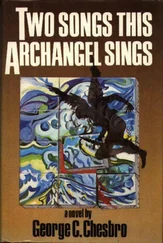Sam nodded. He’d told Duncan nothing about the night in the boat; what Duncan knew of the torpedo, the flames, the boats in the water, he knew from other survivors, not from him.
“If you ever want to talk,” Duncan said, pushing aside his floppy hair, “I’m happy to listen.”

AFTER SAM GRADUATED from college, he mostly kept his work to himself. Axel, busy with his new wife and son, also had new students to train and increasingly relied on his connection to Duncan, who was doing very well as part of his advisor’s group. Duncan and his colleagues shared fly strains with Axel’s lab; Axel and his students collaborated on papers with them, which helped them all. Sam worked alone, steadily and quietly, throughout his years in graduate school, doing nothing without his advisor’s explicit approval, choosing a thesis project closer to his advisor’s heart than to his own and committing to it entirely. He kept in close touch with Avery, who’d gone to England by then, and Avery helped him modify an X-ray source so he could radiate his Drosophila and look for mutations. The experiments he completed were nowhere near as flashy as Muller’s work in this area, nor did he and his advisor gather anywhere near as much data — they were working along parallel tracks at first and then, after Muller had yet another big breakthrough, in support of what he’d already shown — but Sam knew it was solid work, a bandage for his dented reputation. By 1930, when he got his degree, he was able, despite the growing effects of the crash, to find a position in Missouri. In between teaching sections of general biology, he worked every spare minute in his own lab, grateful for what he’d been able to salvage and trying not to envy Duncan, who had followed his advisor out to California and had a much better job.
Half his salary he sent to his mother, who, in the wake of both her parents’ deaths, had taken in boarders but even so was still struggling to hang on to the Philadelphia house. When he lost his job in 1933, he knew she felt the blow too. Although he wrote to everyone he’d ever met, there were no positions to be had. Axel, who temporarily had to close his own lab, could find him nothing, and Duncan couldn’t, or wouldn’t, help, despite being the protégé of someone who’d just won a Nobel Prize. When Sam had nothing to lose and was on the verge of going back home, he appealed to the man whose paper had so inspired him that first winter at college, and whose field he now shared.
He’d written to Muller a few times during graduate school, sending results that confirmed or extended Muller’s own and asking about his latest work. At a conference, Muller had tracked Sam down and inspected his most recent data closely; after that, they’d continued to correspond about interesting questions. If a quantum of light could, as Niels Bohr suggested, trigger photosynthesis, was it also the case that an individual ionization caused a mutation? Did chromosome breaks result from radiation’s direct or indirect effects? After Muller left Austin in the wake of a scandal involving his support of a Communist-leaning student newspaper, he went to Berlin, where, he wrote to Sam, he was collaborating with a brilliant Russian scientist who shared his interest in using the tools of physics to explore the nature of the gene. The work was intriguing, the company stimulating, but just as he was settling in, Hitler was appointed chancellor and soon his colleagues began to lose their jobs. Muller accepted his Russian friend’s invitation to help set up a research program and most recently had written to Sam from the Institute of Genetics in Leningrad.
Was it possible, Sam wrote him, that given his background and their shared interests, he could be of some use at the institute? Secretly, he thought they also shared a disgust with what was going on in their country, the mad inequities that seemed to be destroying every good thing. In Russia, Sam thought, science might assume its rightful role, and scientists, instead of being separated into little fiefdoms ruled by petty kings, would work under the shelter of the state, free to follow their best ideas. He was thrilled when Muller, so enthusiastic himself about the Soviet experiment, found money for a position in which Sam was, if not quite an independent investigator, more than a student.
Soon Sam was living in Leningrad, exploring chromosomal rearrangements and learning that many of the apparent point mutations caused by X-ray treatment were actually recombinations of broken fragments. Segments were lost, segments were duplicated; he began to get a sense of what size a gene might be, and how it might function when moved to a new position. What if natural mutations were actually rearrangements of the particles in the chromosomes, rather than changes to the particles themselves? Muller proved to be an excellent guide. Not a teacher, as Axel had been; not really a friend, like Avery; he was clearly Sam’s superior, but he was accessible and kind, and Sam was thrilled to be working with someone he’d admired for so long.
It hardly mattered that, with housing short everywhere, Sam had to sleep in the corners of other scientists’ rooms, for a while in a bed behind a curtain in the laboratory, later in a basement hall. Everything was crowded, everyone was improvising; he was glad to be part of the common flow, and even the struggle to find supplies was worth it — such work, for such a purpose! Surrounded by Russians day and night, he learned the language quickly. And when the institute was moved to Moscow, Sam went too, leaving behind several friends and a woman with whom he’d had a brief affair.
Writing to his mother — he tried to write home twice a month — he described the farmers and engineers he met, the German Jews who’d sought refuge in the Soviet Union as the Nazis rose to power, the ardently socialist Englishmen and discontented Americans. He met men who’d soldiered in several wars, including one who’d fought against Germans at the beginning of the Great War and then later, in the province of Archangel, with the Reds against Americans. He showed me the white cotton overcoat he’d worn, Sam wrote, which had made him invisible in the snow. He claimed that once, as he’d been scrounging for food in the streets, he’d seen an American soldier leap from the top of a gigantic wooden toboggan run and onto the ice below. Really, I am living in the most remarkable place.
That winter, as the snow fell and fell — he was never warm, no one had enough fuel — Sam thought often of that soldier suspended in the air. Leaping from, or leaping toward? For all the hardships of daily life here, he still felt freer than he had since his time in Axel’s lab, and he moved through Moscow with a sense he hadn’t had in years of everything being interesting. At the Medico-Genetics Institute he saw hundreds of pairs of identical twins — how eerie this was, each face doubled! — being studied like laboratory mice. He visited collective farms, and he met a geneticist named Elizaveta who’d discovered a remarkable mutant fly a few years before Sam arrived. Walking toward her bench was like walking into Axel’s lab for the first time, the air dense with the smells of ether and bananas and flies fried on lightbulbs, the atmosphere of delight. Elizaveta, who had long, narrow, blue-green eyes below the palest brows, said she knew that genes controlled development: but were they active all the time, or did each act only at a particular period of development, and lie dormant otherwise?
At meetings — so many meetings! — he listened to talks about the practical applications of genetics to agriculture and the Marxist implications of the theory of the gene. Once, in a dark room after a day of lectures, he watched a film called Salamandra , about an idealistic scientist who’d demonstrated Lamarckian inheritance in salamanders but was then betrayed by a sinister German who tampered with his specimens to make it look as though his results had been faked. Denounced, deprived of his job, he lived in exile until rescued by a farsighted Soviet commissar who proved his work had been right all along. Partway through, Sam grasped that this was a transposition of the life and fate of Kammerer, who’d killed himself after a researcher proved that some of his results had been faked. By then, his own big mistake seemed very far away.
Читать дальше













